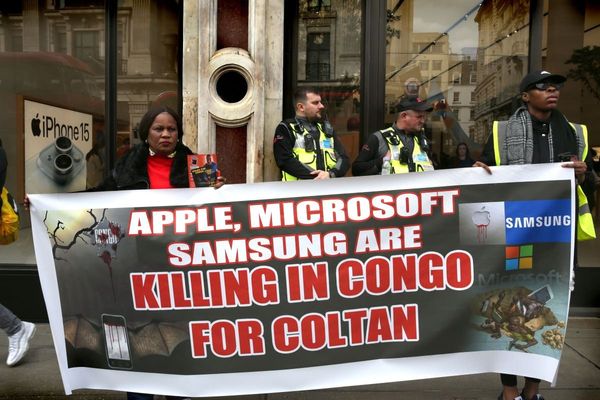Lawyers representing the government of the Democratic Republic of Congo have written letters to tech giant, Apple Inc., seeking further information about the details of its supply chain. The central African country’s authorities are alleging that Apple has been sourcing conflict minerals from the Congo.
Rich in natural minerals, the eastern region of the Congo has been dealing with severe armed conflict between the government’s forces and M23 rebels. A lot of the fighting has centered on controlling the mining and supply of the “3T” materials — tin, tungsten and tantalum — as well as vast deposits of copper, gold and cobalt.
A statement shared by the DR Congo’s lawyers Amsterdam & Partners LLP said that it has written to Apple CEO Tim Cook, asking a series of questions about the company’s sourcing policies and processes. It also wrote to Apple’s subsidiary in France, asking similar questions. The law firm, which said it was contacted by Congolese president Felix Tshisekedi last September, is requesting for answers from Cook and Apple France within three weeks of notice.
“Although Apple has affirmed that it verifies the origins of minerals it uses to manufacture its products, those claims do not appear to be based on concrete, verifiable evidence,” part of the statement read, alleging that Apple’s claim of sourcing its material from Rwanda is bogus, since production of the 3T materials is “near zero” in the east African country.
Tin, tungsten and tantalum are critical in manufacturing smartphones, and the Congolese government has said a mining belt that borders Rwanda and Uganda holds large deposits of coltan, the ore from which tantalum is mined. Mining and trading in the area is largely controlled by M23, and the DR Congo’s authorities have accused Rwanda of colluding with the rebels in smuggling minerals, to the tune of $1 billion per year.
The DR Congo and Rwanda have been in a diplomatic headlock for years, with the former accusing the latter of backing the M23 rebel group. The situation has intensified over the last few months, with negotiations stalling and even affecting relations with neighboring east African country, Burundi.
Calling out Apple is partly an extension of the rocky relationship between the two countries, but it also seeks accountability from the tech giant, who has stated that its sourcing of minerals is environmentally ethical. “In 2023, 100 percent of the identified tin, tantalum, tungsten, gold (3TG), cobalt, and lithium smelters and refiners in Apple’s supply chain completed assessments to verify compliance with our standards,” Apple stated in its environmental report from earlier this year.
The DR Congo’s probe follows a U.S. Court of Appeals ruling from last month that absolves five top tech companies, Apple included, of being involved in child labor in illegal mining operations across the DR Congo.
In the case brought by 16 plaintiffs, including four former miners and legal representatives of child miners, the court ruled that the companies were only involved in an « ordinary buyer-seller transaction » with suppliers in the DRC, and could not be liable for unlawful labor.
From Your Site Articles
Related Articles Around the Web
Crédit: Lien source



